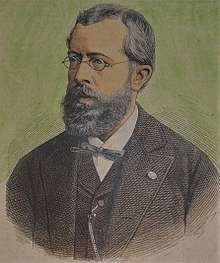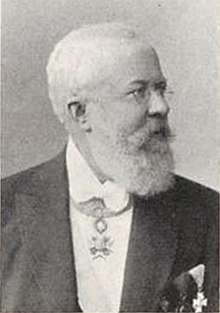Johannes Fastenrath
Johannes Fastenrath (3 May 1839 – 16 March 1908) was a German writer, translator and Hispanist.
Biography

He was born at Remscheid, and studied at the universities of Bonn, Heidelberg, Munich, and Berlin, and in Paris.
He traveled extensively in Spain in 1864, 1869, and 1879, and wrote several works of verse in German after the Spanish manner: Ein spanischer Romanzenstrauss (“A Spanish bouquet of romances,” 1866), Hesperische Blüten (“Hesperian blossoms,” 1869), Immortellen aus Toledo (“Everlastings from Toledo,” 1869); and in Das Buch meiner spanischen Freunde (“The book of my Spanish friends,” 1870), he introduced to German readers the work of contemporary Spanish poets through translations of representative specimens. He translated into German Manuel Juan Diana's comedy La Receta contra las Suegras (German: Rezept gegen Schwiegermütter; “Receipe Against Mothers-in-Law”; 2nd ed., 1872).
His La Walhalla y las glorias de Alemania (“Valhalla and the glories of Germany,” 1872-87) performed a reverse service, describing for Spanish benefit, under the guise of interesting essays, prominent German characters from the days of Hermann. His Pasionarias de un Alemán-Español (“Books of passion from a German-Spaniard”) described the Oberammergau Passion Play. Numerous other original volumes and translations have in a scholarly manner familiarized Germans with much of Spanish literature and history.

He also wrote Den deutschen Helden von 1870 (“To the German Heroes of 1870”), a volume of war songs inspired by the Franco-Prussian War.
Juan Fastenrath married Hungarian Luise (or Luisa) Goldmann (1858-1914), a person who maintained the interests and memory of her husband. In 1889 she was named queen of the Floral Games of Barcelona. In 1909, with the legacy of her husband, she instituted two foundations that bear her name, the "Fundación Premio Fastenrath" and the "Premi Fastenrath", which reward writers for creative works in Spanish language and Catalan language, respectively.
Notes
References
| Wikimedia Commons has media related to Johannes Fastenrath. |
- This article incorporates text from a publication now in the public domain: Gilman, D. C.; Peck, H. T.; Colby, F. M., eds. (1905). . New International Encyclopedia (1st ed.). New York: Dodd, Mead.
- Rines, George Edwin, ed. (1920). . Encyclopedia Americana.